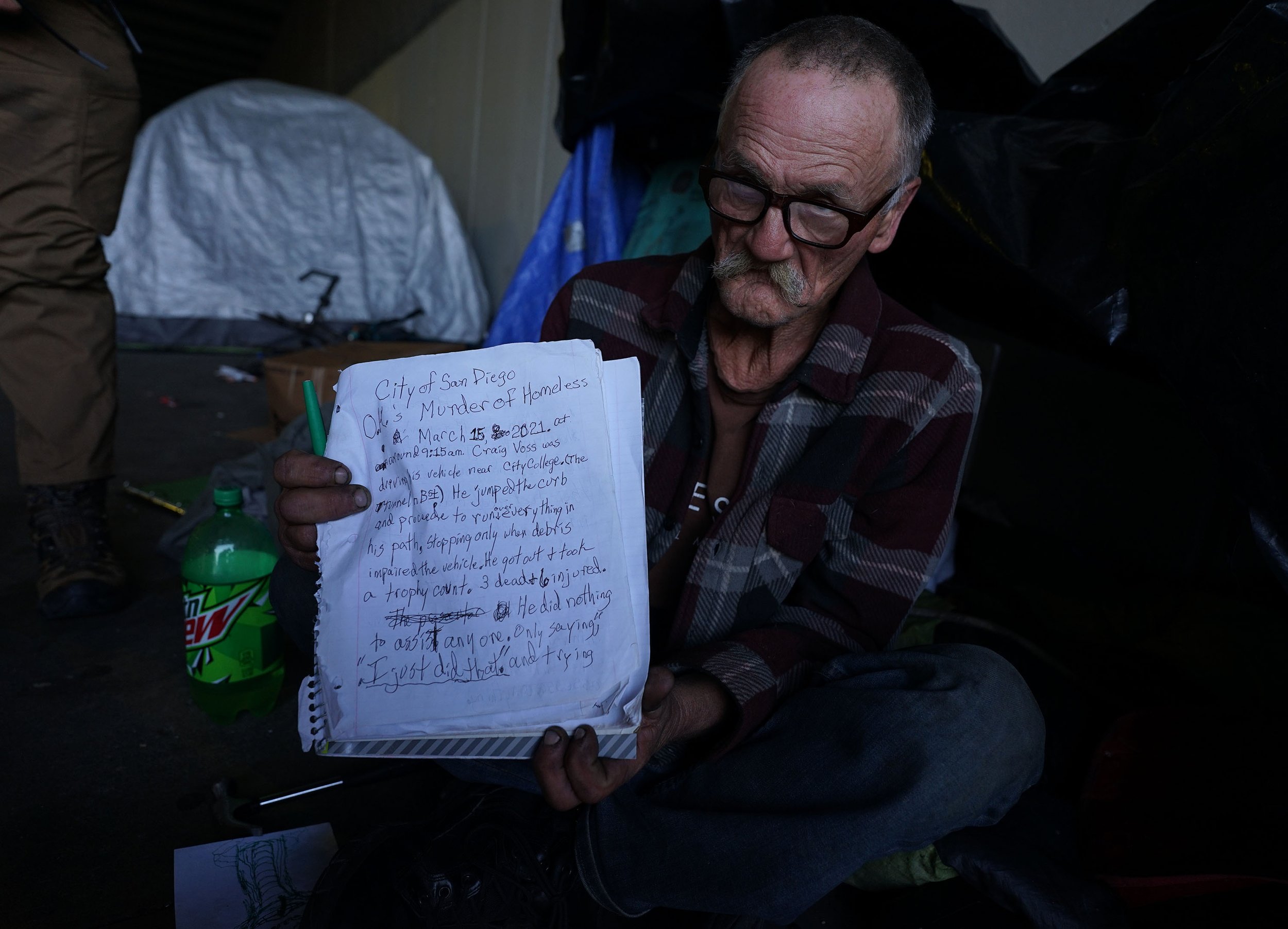Mike
Mike has been reliving a trauma every day for the last three years. His notebook is an angry testimonial to his near death experience, and a memorial to the friends who died that day on the Ides of March 2021. “I was talking with Randy,” Mike said, “and then he was gone.” He wipes away tears with his shirt sleeve as he recounts the memory.
His dark, graphic handwriting reveals the anger, depression and frustration he still holds in his heart and mind. Mike wants city officials to pay reparations to the people who were injured. He feels the drunk driver that mowed down three of his friends got an easy sentence and there was some sort of collusion with the police department in creating a report that gave the murderer a lighter sentence than he deserved.
Mike was sick with the flu the week of the incident, so he was moving slow. “I was talking with Randy and Jimmy, then all hell broke loose. Stuff was flying everywhere. I turned my head a little bit and saw Randy get folded in half. Jimmy wanted to be a homicide detective. He was so good at figuring things out. Then he quit because of something he saw in the field involving a baby. …I miss them.” Randy and Jimmy were his closest friends.
Mike, 55, is originally from Iowa. While he was studying to get his GED, he came to the realization he didn’t really need to be sleeping on the street in sub zero weather. “Anything is better than sleeping in 29 degrees outside.” He said he’d rather die of heat stroke than frostbite, so he hitchhiked out to the west coast. Along the way he got picked up by someone en route to Sacramento who let him live at his house for two years. Mike made a living by “flying signs” and doing heavy construction work.
After he gravitated to San Diego Mike found his way to a group living in a remote area of the downtown freeway complex known by locals as Powerhouse Mountain. He had a cooking kit and made baked lasagna for everyone there. He fashioned a heating stove out of a number 10 can using hand sanitizer with alcohol that he would light up to keep warm. When the rain started coming down that winter of 2021, many residents of Powerhouse Mountain ended up getting washed out. Mike picked up and moved under the bridge near San Diego City College to stay out of the winter rains. He’s been there ever since.
On the anniversary of that fateful car crash, Mike and several others living under tents and tarps under City College woke to the second city clean up notice of the week pinned to their tents. The police put a poster on almost everyone’s tent, giving them 24 hours notice to fold up their belongings and move or lose their tents and everything in it to the dumpster when a clean up crew came through with a power washer and sanitizer. Mike plans to clean up early in the morning and move across the street. The added, more aggressive enforcement of citing homeless for being homeless after the recent passage of the camping ban “has made it illegal to be anywhere,” he added. “They’re kicking us when we’re down.” He said he is taking a page from the Sioux Nation playbook and standing his ground “The government stole their land and murdered 20 million” Native Americans. He feels similarly persecuted.
Mike is used to waking early and walking all day because if he sits down for long he’ll fall asleep. “Most people down here stay awake and sleep in shifts through the night,” he said. He has tried the shelter system, but during COVID when homeless individuals were put up in the convention center or Golden Hall, he saw more people getting sick inside than those who stayed outside, so he stayed on the streets. Mike said he heard people were getting tuberculosis at Golden Hall. He didn’t feel his own immune system could withstand that type of assault. “That’s what Doc Holliday died of,” he said. “And I’m not a famous gunslinger.”
Every day he relives the mental memory of the car crash that killed his best friends. “I still throw up when I think about it too much,” he said. “It feels like yesterday.” So he writes in his notebook and makes plans to address the San Diego City Council seeking harsher punishment for the driver and financial assistance for those that were injured. He felt the paramedics were careless and rough with the injured because they were homeless. He misses Waterman Dave who was a fearless advocate for homeless individuals, and wonders if he has what it takes to step in and be the new voice for the voiceless at city council meetings.



